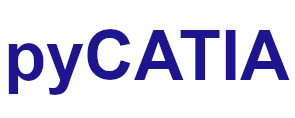pycatia.structure_interfaces.str_plates¶
Module initially auto generated using V5Automation files from CATIA V5 R28 on 2020-09-25 14:34:21.593357
Warning
The notes denoted “CAA V5 Visual Basic Help” are to be used as reference only. They are there as a guide as to how the visual basic / catscript functions work and thus help debugging in pycatia.
- class pycatia.structure_interfaces.str_plates.StrPlates(com_object)¶
Note
CAA V5 Visual Basic Help (2020-09-25 14:34:21.593357)
System.IUnknownSystem.IDispatchSystem.CATBaseUnknownSystem.CATBaseDispatchSystem.CollectionStrPlatesA collection of the Plate objects contained in a given Product object of aProductDocument object.A Product object can aggregate one or zero Plates collection. This collectionis retrieved using the Product.GetTechnologicalObject method of theproduct.Example:The following example retrieves the plate collection from the oProductProduct.Dim oPlates as AnyObjectSet oPlates = oProduct.GetTechnologicalObject(“StructurePlates”)Method IndexItemReturns a plate from its index in the Plates collection.RemoveRemoves a plate from the Plates collection.Methodso Func Item( CATVariant iIndex) As StrPlateReturns a plate from its index in the Plates collection.Parameters:iIndexThe index of the plate to retrieve in the collection of plates.This index can either be the rank of the plate in the collection or the nameyou assign to the plate. As a numerics, this index is the rank of the plate inthe collection. The index of the first plate in the collection is 1, and theindex of the last plate is Count. As a string, it is the name you assigned tothe plate using theAnyObject.Name propertyReturns:The retrieved plateExample:The following example returns in ThisPlate the third plate, and inThatPlate the plate named EndPlate_1 in the Assembly_1 platecollection.Dim ThisPlate As PlateSet ThisPlate = Assembly_1.Item(3)Dim ThatPlate As PlateSet ThatPlate = Assembly.Item(“EndPlate_1”)o Sub Remove( CATVariant iIndex)Removes a plate from the Plates collection.Parameters:iIndexThe index of the plate to remove. This index can either be the rankof the plate in the collection or the name you assigned to the plate. As anumerics, this index is the rank of the plate in the collection. The index ofthe first plate in the collection is 1, and the index of the last plate isCount. As a string, it is the name you assigned to the plate using theAnyObject.Name propertyExample:The following example removes the sixth plate and the plate namedEndPlate_1 from the Assembly_1 plate collection.Assembly_1.Remove(6)Assembly_1.Remove(“EndPlate_1”)Copyright © 1999-2011, Dassault Systèmes. All rights reserved.- item(i_index: cat_variant) StrPlate¶
Note
- CAA V5 Visual Basic Help (2020-09-25 14:34:21.593357))
- o Func Item(CATVariant iIndex) As StrPlateReturns a plate from its index in the Plates collection.Parameters:iIndexThe index of the plate to retrieve in the collection of plates.This index can either be the rank of the plate in the collection or the nameyou assign to the plate. As a numerics, this index is the rank of the plate inthe collection. The index of the first plate in the collection is 1, and theindex of the last plate is Count. As a string, it is the name you assigned tothe plate using theAnyObject.Name propertyReturns:The retrieved plateExample:The following example returns in ThisPlate the third plate, and inThatPlate the plate named EndPlate_1 in the Assembly_1 platecollection.Dim ThisPlate As PlateSet ThisPlate = Assembly_1.Item(3)Dim ThatPlate As PlateSet ThatPlate = Assembly.Item(“EndPlate_1”)
- Parameters:
i_index (cat_variant) –
- Return type:
- remove(i_index: cat_variant) None¶
Note
- CAA V5 Visual Basic Help (2020-09-25 14:34:21.593357))
- o Sub Remove(CATVariant iIndex)Removes a plate from the Plates collection.Parameters:iIndexThe index of the plate to remove. This index can either be the rankof the plate in the collection or the name you assigned to the plate. As anumerics, this index is the rank of the plate in the collection. The index ofthe first plate in the collection is 1, and the index of the last plate isCount. As a string, it is the name you assigned to the plate using theAnyObject.Name propertyExample:The following example removes the sixth plate and the plate namedEndPlate_1 from the Assembly_1 plate collection.Assembly_1.Remove(6)Assembly_1.Remove(“EndPlate_1”)
- Parameters:
i_index (cat_variant) –
- Return type:
None
